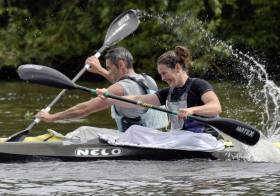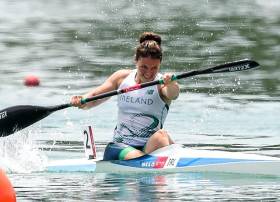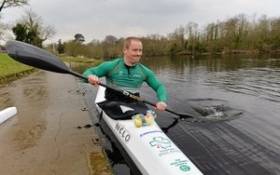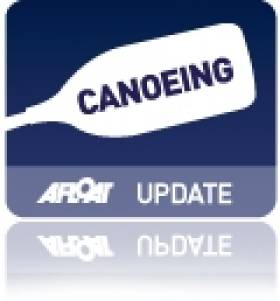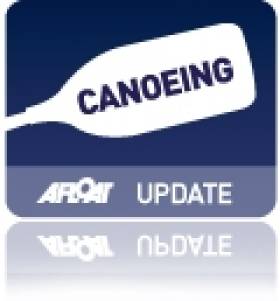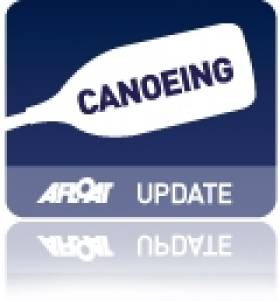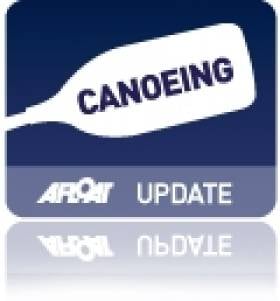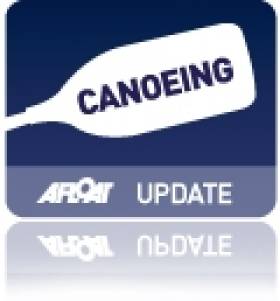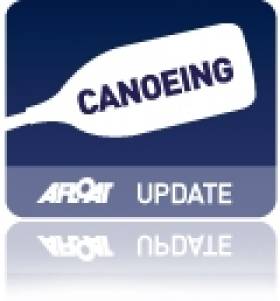Displaying items by tag: Egan
Jenny Egan and Peter Egan in Same Boat for Liffey Descent
#Canoeing: An international contingent will take on the Liffey Descent this Saturday, September 23rd. A Spanish crew who are determined to beat all comers in the canoe race will contend with a world champion from South Africa in a field of over 500 competitors. The Irish resistance will include a first time pairing in the race of world championship medallist Jenny Egan with her brother Peter – a winner last year.
Top competitors will be fitted with GPS trackers so the public can follow their progress down the course.
The race from Straffan in Kildare to Islandbridge in Dublin is one of the most spectacular events of the Irish sporting calendar. Kayaks and canoes will hurtle down the 30-kilometre stretch. They will find their way over 10 weirs, and paddlers must scramble out and carry their boat down the bank at Leixlip. Spectators can view the speed and the spills from the bridges and the banks. The start is at 12 o’clock.
The line-up for the K2, the racing kayak which is set to be the fastest boat of the day, should make for an exciting race.
Ireland international Barry Watkins teams up with Jon Simmons, who has been coaching developing paddlers in Ireland system. They take on the accomplished Spanish pairing of Luis Amado and Miguel Llorens, who took fourth in the World Marathon Championships in South Africa earlier this month. From South Africa comes Sean Rice, a world champion in surfski racing, who teams up with Briton Tom Sharpe.
Last year Peter Egan was in the front of the K2 which won – this time the paddler behind him will be his sister, Jenny, in a mixed K2. “We’ve always wanted to do it, but the circumstances were never right before,” Jenny said.
The Egans come directly from the World Championships, where Jenny took a bronze medal. But they will be tested on Saturday. From Germany comes Andreas Heilinger and Inez Bauerle; from the Netherlands, Pascal Lucker and Eef Haaze.
Ireland international Tom Brennan will hope to retain his title in the K1 (individual racing kayak). He fell in at Straffan last year and then got back on track to win. Ronan Foley, who was the fifth best junior at the World Championships in South Africa, could test him.
They will be competing for silver trophies, back as rewards in this race after a time when they were not presented.
O'Leary Ninth in A Final as Egan Misses Out
#Canoeing: Patrick O’Leary finished ninth in the A Final of the KL3 200 metres at the Paracanoe World Championships in Racice in the Czech Republic. The race was won by Serhii Yemelianov of the Ukraine.
Jenny Egan finished eighth in her semi-final of the K1 200 at the Canoe Sprint World Championships, also at Racice. She missed out on an A or B Final place. Egan is set to compete in the K1 5,000 metres on Sunday.
O'Leary Pipped for World Championships A Final Place
#Canoeing: Patrick O’Leary set a new personal best for the second sucessive day, but just missed out on a place in the A Final at the Paracanoe World Championships in Duisburg in Germany this morning. The 43-year-old Irishman finished third in his semi-final of the KL3 200 metres. The top two from the semi-finals and the fastest third place finisher would go through – and O’Leary was pipped by less than seven tenths of a second by France’s Martin Farineaux for this place. Farineaux finished third in the fourth of the four semi-finals. O’Leary qualifies for the B Final.
In the canoe sprint European Olympic Qualifier, Ireland crews qualified for semi-finals through their heats. Michael Fitzsimon finished 4th in the K1 1,000, Jenny Egan fifth in the K1 500 and the K2 200 crew of Tom Brennan and Barry Watkins were sixth.
Paracanoe World Championships, Duisburg (Selected Results; Irish interest):
Men - KL3 200- Heat Four (First Seven to Semi-Final): 2 P O’Leary 42.061. Semi-Final One (First Two and next best time to A Final; 3rd, 4th to B Final): 3 O’Leary 41.722.
Canoe Sprint European Olympic Qualifier, Duisburg, Germany
Men
K1 1,000 – Heat One (Winner to A Final; 2-7 to semi-final; rest out): 4 M Fitzsimon 3:31.693.
K2 200 – Heat One (First Three to A Final; 4-7 to semi-final): 6 T Brennan, B Watkins 34.350.
Women
K1 500 – Heat One (Three to Final; 4-7 to Semi-Final): 5 J Egan 1:55.428.
Fleming's K2 Fastest in Liffey Descent
#CanoeingLiffeyDescent: Neil Fleming and Robin Koenders were the fastest crew home at the 56th Liffey Descent today. In a race run in warm sunshine and light winds from Straffan to Islandbridge, the K2 of Fleming and Dutchman Koenders gained a considerable lead by Lucan over nearest challengers Gary Mawer and Barry Watkins. The winning time of one hour 48 minutes 32 seconds was outside the record for the course.
The fastest K1 paddler was Tom Brennan, winning this class for the first time, and coming home well under two hours.
Jenny Egan and her boyfriend Jon Simmons won the mixed K2. They set a new record time of one hour 53 minutes and 26 seconds.
Liffey Descent 2015 (Selected Results)
K2: 1 R Koenders, N Fleming 1 hour 48 minutes 32 seconds, 2 B Watkins, G Mawer 1:51.00, 3 L Van Riet, E Van Riet (Sth Africa) 1:51.42. Junior: C Crate, J O’Hagan 2:05.04. Master: D Halton, J Morrissey 2:02.51.
K1: 1 T Brennan 1:56.22, 2 J Boyton 1:59.38, 3 M Brennan 1:59.44. Junior: E Forristal 2:05.35.
K2 Mixed: J Simmons, J Egan 1:53.26.
Wildwater - Junior: C Clarke 2:19.16
General Purpose – Junior: 2:35.34. Masters: J Mescal 2:31.30. Veteran: E Moran 2:43.36.
Jezierski and Jenny Egan To Compete in B Finals in Baku
#CANOEING: Ireland’s Andrzej Jezierski qualified for the B Final (places 10 to 18) of the men’s C1 200 metres at the European Games in Baku, Azerbaijan today. Jezierski finished sixth in his heat but improved to fifth in his semi-final. Jenny Egan will compete in the B Final of the K1 500, having qualified on Sunday. She made the semi-finals in the K1 200m but her eighth-placing there means she did not make it through to the A or B final. She is also set to compete in the K1 5000m straight final tomorrow.
Peter Egan and Simas Dobrovolskis finished eighth of eight in their heat of the K2 200m and did not qualify for the semi-finals, while Tom Brennan in the K1 200 made it to the semi-finals but finished outside the qualification mark for the A and B Finals.
European Games 2015, Baku, Azerbaijan
Canoe Sprint (Irish interest)
Men
K2 200 – Heat One: 8 P Egan, S Dobrovolskis 35:049.
K1 200 – Heat Two: 6 T Brennan 35.446. Semi-Final: 8 Brennan 36.191.
C1 200 – Heat One: 6 A Jezierski 42.339 seconds. Semi-Final One: 5 Jezierski 40.277
Women
K1 200 – Heat Three: 6 J Egan 42.843. Semi-Final Two: 8 J Egan 42.657.
K1 500 – Heat One: 6 J Egan 1:55.468. Semi-Final: 7 J Egan 1:52.536.
Egan and Brennan Go Out at Semi-Final Stage in Duisburg
#CANOEING: Ireland’s Tom Brennan and Jenny Egan failed to make it through their semi-finals at the Canoe Sprint World Cup in Duisburg, Germany today. Egan finished eighth and Brennan ninth in their K1 200 races. Egan goes in the K1 5,000 metres on Sunday. and paracanoeist Pat O’Leary competes in the A Final of the KL3 200 metres.
Canoe Sprint World Cup, Duisburg, Germany (Irish interest)
Men,
K1 200m – Semi-Final Four: 9 T Brennan 38.361
Women
K1 200 – Semi-Final Two: 8 J Egan 44.124.
Jenny Egan in World Cup Semi-Final at Duisburg
#CANOEING: Jenny Egan qualified for the semi-final of the K1 200 metres by finishing fourth in her heat this evening at the Canoe Sprint World Cup in Duisburg. Egan also qualified for semi-finals of the K1 500m, but finished seventh and takes a place in the the C Final (places 19 to 27). Barry Watkins and Michael Fitzsimons, in the K2 1,000, also qualified for the semi-finals, but their ninth-place finish meant they missed out on the C Final. Tom Brennan qualified for the semi-final of the K1 200m. Ireland will have at least one finalist, as paracanoeist Pat O’Leary took second in his heat of the KL3 200 metres.
Canoe Sprint World Cup, Duisburg, Germany (Irish interest)
Men, KL3 200m – Heat Two (First Three Directly to Final; rest to Semi-Final): 1 Germany (T Keirey) 41.870 seconds, 2 Ireland (P O’Leary) 44.245, 3 Russia (V Potanin) 44.658.
K2 1000m – Heat Four: 6 B Watkins, M Fitzsimons 3:21.908. Semi-Final Three: 9 Watkins, Fitzsimons 3:21.699.
K2 200 – Heat One: 9 P Egan, S Dobrovolskis 34.976.
K1 200m – Heat Three: 5 T Brennan 37.462
Women
K1 200 – Heat One: 4 J Egan 44.171 seconds (to Semi-Final).
500m – Heat One: 7 J Egan 1:57.293. Semi-Final Three: 7 Egan 1:55.688.
#CANOEING: Jenny Egan brought Ireland a first senior medal at the European Canoe Sprint Championships when she took bronze in the Women’s K1 5,000 metres in Racice in the Czech Republic today. Egan, from the Salmon Leap club in Leixlip, was part of a successful breakaway at 1,000 metres with Maryna Litvinchuk of Belarus, who took gold, and Irene Burgo of Italy, the silver medallist. Less than two-thirds of a second divided the three.
Ireland paracanoeist Patrick O’Leary finished fourth in his KL3 200 metre final. Robert Oliver of Britain took gold. O’Leary was just a third off a second of taking bronze.
European Canoe Sprint Championships, Racice, Czech Republic (Selected Results; Irish interest)
Saturday
Men
K2 200 – Heat Three (First Three to A Final; 4-7 to B Final; rest out): 1 Serbia 31.676; 8 P Egan, S Dobrovolskis 34.808.
C1 200 - Heat Three (Winner to Final; second to seventh to semi-final): 1 Portugal (H Silva) 39.236; 7 A Jezierski 43.220. Semi-Final: Jezierski did not start.
K1 200 – Heat Two: 6 T Brennan 37.596. Semi-Final (First Three to A Final, 4-7 to B Final): 1 Latvia (A Rumjancevs) 36.072; 7 T Brennan 37.852
Paracanoe KL3 – A Final: 1 Britain (R Oliver) 40.88; 4 P O’Leary 42.536.
Women
K1 200 – Heat Three (Winner to Final; second to seventh to semi-final): 1 Serbia (N Moldovan) 40.236; 7 J Egan 43.384. Semi-Final (First Three to A Final, 4-7 to B Final): 1 Russia (N Podolskaya) 42.196; 7 Egan 45.344.
Sunday
Men
K1 200 – B Final: 5 T Brennan (14th overall)
K1 5,000 – A Final: 18 P Egan 22:58.09.
Women
K1 5,000 – A Final: 1 Belarus (M Litvinchuk) 22 mins 19.25 seconds, 2 Italy (I Burgo) 22:19.68, 3 Ireland (J Egan) 22 mins 19.9 seconds.
K1 500 – B Final 6 J Egan 2:00.376. (15th overall)
K1 200 – B Final: 7 J Egan 44.896 (16th overall)
B Finals for Egan and Brennan at European Sprints
#CANOEING: Jenny Egan and Tom Brennan moved into B Finals but Andrzej Jezierski did not start his semi-final of the C1 200 at the European Canoe Sprint Championships in Racice in the Czech Republic. Egan was competing in the K1 200 and Brennan in the men’s equivalent. Peter Egan and Simas Dobrovolskis finished eighth in their heat and did not make it to the semi-final.
European Canoe Sprint Championships, Racice, Czech Republic (Selected Results; Irish interest)
Men
K2 200 – Heat Three (First Three to A Final; 4-7 to B Final; rest out): 1 Serbia 31.676; 8 P Egan, S Dobrovolskis 34.808.
C1 200 - Heat Three (Winner to Final; second to seventh to semi-final): 1 Portugal (H Silva) 39.236; 7 A Jezierski 43.220. Semi-Final: Jezierski did not start.
K1 200 – Heat Two: 6 T Brennan 37.596. Semi-Final (First Three to A Final, 4-7 to B Final): 1 Latvia (A Rumjancevs) 36.072; 7 T Brennan 37.852
Women
K1 200 – Heat Three (Winner to Final; second to seventh to semi-final): 1 Serbia (N Moldovan) 40.236; 7 J Egan 43.384. Semi-Final (First Three to A Final, 4-7 to B Final): 1 Russia (N Podolskaya) 42.196; 7 Egan 45.344.
Jezierski Misses Chance By Trying Too Hard to Start Fast
#CANOE SPRINT: Andrzej Jezierski’s challenge in the semi-finals of the Canoe Sprint World Cup in Szeged, Hungary ended before it began. The Ireland competitor first had a false start and then, straining to get an edge second time around, he fell in just before the race was due to begin. He was disqualified and the race went off without him. Jenny Egan finished ninth in the women’s K1 200 metres semi-final and Peter Egan and Simas Dobrovolskis filled the same position in the K2 200m semi-final.
Canoe Sprint World Cup, Szeged, Hungary (Irish interest)
Men
C1 200m – Heat One: 1 Russia (A Korovashkov) 41.746, 2 Kazakhstan (M Medetov) 43.888, 3 Ireland (A Jezierski) 43:978. Semi-Final One: Jezierski disqualified.
K1 500m – Heat One: 6 B Watkins. Semi-Final Three: 3 Watkins.
K1 1,000m – Heat Four: 7 B Watkins. Semi-Final Two: 8 Watkins.
K2 200m – Heat Four: 6 P Egan, S Dobrovolskis.
Women
K1 200 – Heat One: 7 J Egan. Semi-Final: 9 Egan.
K1 500 – Heat One: 7 J Egan. Heat Two: 7 J Burke. Semi-Final Two: 8 Burke. Semi-Final Four: 9 Egan.
K1 1,000 – Heat One: 4 J Burke.


























